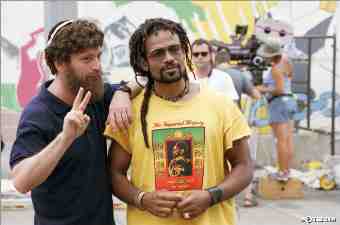
Howie Mandel, left, and Mario Van Peebles on the set filming "Crown Heights."
The New York Times
The Arts, Pg. 1
TELEVISION REVIEW
Finding Crown Heights Peace: Hip-Hop and Hope

Howie Mandel, left, and Mario Van Peebles on the set filming
"Crown Heights."
By ALESSANDRA STANLEY
The scandal of Black History Month is not, as black comedians so often point out, that the powers that be picked the shortest month.
The setting aside of any one month as the designated time to celebrate the African-American experience encourages television executives to select only the blandest, most hortatory specials. For February's 28 days (29 in a leap year) viewers are showered with uplifting biographies, civil rights documentaries and made-for-television movies that are so careful not to confound or offend that they are almost painful, like watching a high school senior trying to sit up straight all the way through a college interview.
Tonight's Showtime offering, ''Crown Heights,'' a drama set during the 1991 racial unrest in Crown Heights, Brooklyn, could easily have turned into a race-based episode of ''The Partridge Family.'' The film follows the friendship of two teenagers, a former gang member named T. J. (DeQuan Henderson) and a Hasidic Jew named Yudi (Jeremy Blackman), who in the wake of the violence form a bicultural rap group, Project Cure. (''Can we find a different way/cuz we was all slaves back in the day/we're all trying to get by/one borough to share/we can all survive.'')
There was such a band, here called Project Cure, and some of the film's characters
are based on real people. Guided by a hip Hasidic rabbi, David Lazerson, known
as Laz (Howie Mandel), and a Baptist minister and youth counselor, Paul Richards
(Mario Van Peebles), Project Cure quickly attracts the attention of the news
media and is embraced by city leaders as a symbol of healing in an otherwise
blighted atmosphere of racial tension and mistrust. Project Cure is invited
to perform at halftime of a Knicks game at Madison Square Garden.
''Crown Heights,'' however, does not turn the story into an easy feel-good morality
tale like ''Brian's Song'' or the hokey hockey movie ''Miracle.''
By resisting the made-for-television temptation to sweeten the truth artificially,
Jeremy Kagan, the director, gives resentment and disillusionment their due,
providing a nuanced and affecting look at race relations as they were then and
as they are still lived today.
The two groups live side by side in Crown Heights in relative peace these days, but rage boiled over in August 1991, on the day a 7-year-old, Gavin Cato, was killed by a car that was part of a motorcade escorting Menachem M. Schneerson, the grand rebbe of the Lubavitcher sect. Violence erupted almost immediately, and three hours later an Australian rabbinical student, Yankel Rosenbaum, was stabbed to death nearby.
To lend the film a historical context and a grittier edge, the story is interspersed with occasional black-and-white interviews with Crown Heights residents, blacks and Jews, who express their very different and often harsh views of the accident and of each other. Perhaps because the Crown Heights incidents remain a raw issue (Lemrick Nelson, the man accused of the stabbing, was sentenced to 10 years in prison last August after being convicted of violating Rosenbaum's civil rights) neither death is shown. Oddly, however, in a film that is so careful not to offend sensibilities, the Jewish victim is cited by name several times, but the name of the 7-year-old black child is not used.
Gavin Cato's death occurs off screen. Rabbi Lazerson is in his van rocking to reggae music when he hears the screech of tires and a fearsome crash. Viewers are shown only the shocked faces of witnesses to the accident.
Similarly, the stabbing of Rosenbaum is conveyed secondhand. Yudi and his father, Moshe (Jason Blicker), are waylaid by a group of angry black youths, and one of them jabs Moshe with a broken bottle. Moshe is only lightly wounded, but while he is being stitched up at the hospital he and Yudi hear the news about Rosenbaum's death.
Yudi, however, loves rap. After unwinding the leather straps binding to his
arm, the tefillin that Orthodox Jews wear at prayer, Yudi straps earphones to
his head and listens to rap.
He and T. J. discover their shared taste in music after a meeting that community
leaders arrange to defuse neighborhood tensions. (''Why do you Jews only wear
black?'' a black youth asks the Jewish youths. ''So we don't shoot each other
over sneakers and jackets,'' one of them snaps back.)
The band, led by rappin' rabbi Laz (Mandel) and Paul (Van Peebles), is excruciating
to watch, but Yudi's love of rap seems genuine. Both he and T. J. have mixed
feelings about the youth group and each other, and the ups and downs of their
alliance are depicted forthrightly, without too much romanticism or condescension.
The film ends on a hopeful note -- this is the month for it -- but not on a
false one. And that is perhaps the most fitting tribute to the victims of Crown
Heights.
CROWN HEIGHTS
Showtime, tonight at 9, Eastern and Pacific times; 8, Central time
Produced and directed by Jeremy Kagan; written by Toni Ann Johnson; story by
Michael D'Antonio; based on the book Sharing Turf, by Dr. David Lazerson. A
Jeremy Kagan production.
WITH: Mario Van Peebles (Paul Richards), Howie Mandel (Dr. David Lazerson),
Jeremy Blackman (Yudi Simon), DeQuan Henderson (T. J. Moses) and Jason Blicker
(Moshe Simon).